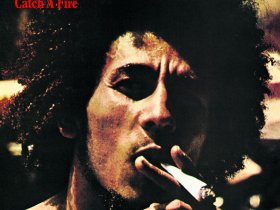When Catch A Fire was released in 1973, the Wailers already had three studio albums (The Wailing Wailers (1965), Soul Rebels (1970) and Soul Revolution (1971)) under their belts, along with a best of collection and varying singles that popped up throughout the time span at which point they were signed to CBS Records.
As the story goes, while in Europe to work with Johnny Nash on the soundtrack to a film entitled Want So Much To Believe in 1972, the Wailers found themselves in a financial turmoil when Chris Blackwell, the founder of the then indie label Island Records, invited them to his headquarters with the intent of signing them to his label.
"They were in town to do music for a film, but the film didn't receive its financing. So the person who had taken them over -- his name was Danny Sims -- hadn't gotten them a ticket back to Jamaica from London, so they were stranded there. He said, 'Well, I'd like you to meet with them.' And literally, this was ten days before Jimmy Cliff had decided to leave Island [Records] to go to another label. I was kind of devastated about that... When they came in, it was like the real life character from the movie, The Harder They Come. They weren't actors, they were real rebels trying to get a fair deal in a rotten system," reminisced Blackwell in an interview with theboombox.com.
An avid fan of the group, Blackwell made the most of the moment and signed Bob Marley and the Wailers to the label to work with them in a larger capacity having already released a handful of Wailers songs in the UK. After their varying discussions, Blackwell reportedly gave them an advance and covered their traveling costs for them to return to Kingston, Jamaica to record 'Catch a Fire.'
Thanks to the band consistent and goal-inspired work ethics, the album was completed in little to no time and submitted where the original songs were enhanced and overdubbed to appeal to a larger audience.
"I went out to Jamaica after the record was finished and told them I'd love to hear it. When I heard it, I was just blown away. I felt I could do some stuff to it to make it stand out. This is why I put a very special cover on it initially. The cover you see on it now isn't the initial cover," explains Blackwell.
"I was blown away by the album after I heard the first single, Concrete Jungle. I still get goose bumps when I listen to it today. I thought it was such an incredible, progressive song. Then the second one was Slave Driver and I just loved the groove of it. It was from Slave Driver that I got the idea for the title. Slave driver the tables have turned, catch a fire and you're gonna get burned. I thought Catch A Fire was such a great title for a launching of a new movement,' he added.
The idea Blackwell had was to make the band marketable to rock audiences in the U.S. Originally, the cover of the original 1973 album featured a Zippo lighter that opened up and the group's revised name "The Wailers." A few years later, an alternate and more popularized cover was used, featuring Esther Anderson's photograph of Bob smoking a joint, and the band's full name "Bob Marley and the Wailers."
The new cover attracted an international audience in two ways. Firstly, it spread the group's Rastafarian ideology and image, displaying the religious sacrament, ganja (marijuana), and secondly, cemented Reggae as this new "rebel" sound parallel to rock music.
Overall, 'Catch a Fire' had a mammoth effect on popular music not only influencing the sound of black music in general but other genres like punk and rock.
Blackwell sits proudly having contributed to the success of such an influential album and having worked with Bob Marley and the Wailers and ultimately introducing them to the world at large.
"I'm incredibly proud to have been a part of it," Blackwell told theboombox.com. "I consider myself very fortunate. He was stranded in England and came walking into my office. The only thing I ever did for him was to put him in the direction to find his audience. That was really it. I'm very proud of it. His records speak for themselves."
Watch this 1999 documentary dubbed 'Classic Albums' on Bob Marley & the Wailers Catch A Fire













 less
less
 more
more